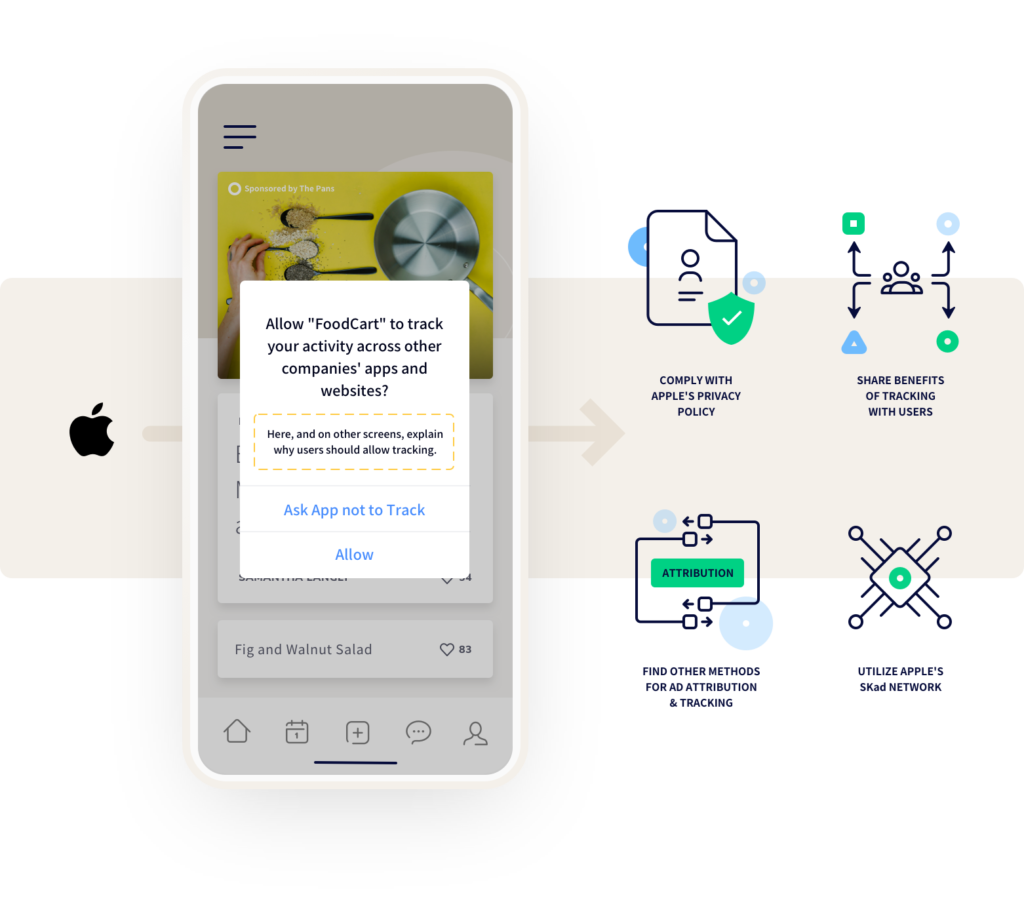During the yearly Worldwide Developers Conference (WWDC) in June 2020, Apple released a lot of changes in its operating system iOS14. While Apple reported that one of the major focal points of iOS 14 would be to improve user privacy, many app developers had a lot of questions in their minds that how the iOS development will affect from this update in the coming future. Even though iOS 14 was released in 2020, Apple won’t make the privacy updates mandatory until 2021, to give the iOS app developers an ideal opportunity to thoroughly consider the updates in their development process.
These privacy updates to iOS have wiped out a significant component of in-application mobile advertising and tracking done by the Apple Identifier for Advertisers (IDFA). As indicated by the new update, it will require the applications to ask the clients for authorizations to gather and share user data.
Big changes in iOS 14.5 privacy update
A lot of changes have been introduced by Apple to make iOS a more secure platform than Android. With the advent of these privacy updates, developers need to ask for explicit permission for accessing the device IDFA. This update will help to maintain the privacy of the client, but the developers need to embrace new measures in their iOS application development. Let us understand the update and how developers have to address them in their applications.
- Prompt for IDFA (Identifier for advertisers) access:
Apple’s identifier for advertisers (IDFA) is a random string of numbers and letters (such as 83289B22E-6283-4CA4-8T2C-73682622YAFC) assigned to an Apple device that is used for advertisement targeting depending upon the user activity on the device. Beginning with iOS 14.5, the iOS applications need to get consent from end-users to utilize the Identifier for Advertisers (IDFA). Allowing this IDFA access simply means giving the consent to track the user across applications and services.
Previously, the user IDFA was shared among all the applications in the devices, and they can likewise quit Interest-Based Advertising whenever they want. However, iOS 14.5 will change this setting from a device level option to permission that should be obtained for each application. This change will help users maintain their data privacy and would lead to a significant decrease in the number of clients who will be sharing their IDFA with developers.
- Ad targeting and retargeting won’t work:
Ad targeting and retargeting to the users will not work this point forward for the users that have denied sharing their IDFA. Various big platforms like Google and Facebook have other deterministic factors they can use to distinguish the devices (such as email, telephone number). The other platforms that don’t have such deterministic ID information are probably going to see a decrease in the targetable audience.
- App Tracking Transparency:
The new privacy policy will be a critical move in how app developers can gather data on Apple devices and offer that data to different firms, including data brokers, to help in advertising. Apple as of now accompanies the feature of Intelligent Tracking Prevention (ITP) which does not allow cross-domain tracking. With iOS 14.5, there will be a Privacy Report passed to the users not withstanding the ITP. It will tell the end users which organizations it is blocking from surveying their data.
- Applications must ask for consent for tracking user’s data:
Anybody utilizing the current version of iOS can see “App Tracking Transparency”, since currently iOS has a Tracking menu for the Privacy settings, and some applications have effectively begun requesting the clients for consent to track them. With the new iOS Privacy update, Apple device users will see significantly more permission requests. The requests will pop up at different points during the use of an application, and convey a standardized message finding out if the application can track your activity across other organization’s applications and sites.
After an application has requested this consent, it also appears in the Tracking menu, where clients can toggle the app tracking on and off. Users can enable app tracking across all applications or cancel the requests altogether with a single toggle.
What should app developers do after the policy update:

-
Developers must guarantee that they comply with Apple’s privacy policy:
The new policy requires all the developers to provide the users with new App Store privacy disclosure, the developers are not needed to change or alter their current privacy policy. The app developers have to link their policy both on the App Store download page and inside the actual application to guarantee their users know their data practices. Currently, the developers can review their current privacy policy and ensure that they comply with Apple’s privacy policy.
-
Developers should explain to users why they should allow tracking them:
The app developers should attempt to convey to users the benefit of sharing their IDFA. Apple permits the app developers to change the text that appears in the pop-up while asking for consent from the users. It also permits the developers to produce a different pop-up that gives more clear and detailed clarification directly before Apple’s default pop-up appears, so far till the developer’s clarification isn’t deluding.
The developer should acquire consent before it can gather the user’s IDFA, yet this consent doesn’t really should be provided immediately while launching the app. Some developers may decide to show the ATT pop-up while launching to expand the measure of data they can track, while others may decide to stand by and wait for an ideal opportunity to surface the pop-up when the users are likely to allow the IDFA tracking.
-
Search for an alternative method for ad attribution and tracking:
The app developers must search for the different methods for advertising and advertisement attribution that don’t depend on the user’s personal information to maintain their business. This will come in handy if more iOS users decide to disable the IDFA sharing employing Limit Ad Tracking.
-
Leverage Apple’s SKad Network:
Apple has also released the SKAd Network by keeping in mind the interest of the ad platforms for tracking and attribution. SKAd Network likewise recognizes re-downloads, which helps ad networks measure the accomplishment of re-engagement campaigns. In spite, this innovation might only help track attribution. The network won’t share any user’s data with the developers or advertisers. This is not exactly ideal since Apple has demonstrated that SKAd Network will only consider the click-based attribution. It will also cut off the total number of campaign advertisements.
How is the new privacy policy affecting the big tech?
The consent screen is a frightening prompt for users. Enormous Tech organizations like Facebook, which are reliant on the IDFA and user’s data for their business, are making clarification prompts to mollify the blow and to persuade users to allow consent to Facebook to track them.
Various advertisement industries have additionally disagreed with Apple’s new privacy policy. Since a great number of iOS users won’t allow the authorizations to track them, joined with the intricacy of other protection guidelines, implies that developers and organizations will be searching for better approaches to track the clients without the IDFA- however that will not be a simple interaction.
During this significant change to Apple’s privacy policy, the app developers need to find a harmony that permits them to attempt new methods, while simultaneously complying with the privacy policy, and keeping up their user’s trust. We at Sofy are constantly working to keep up with the changes in the ecosystem and recommend best practices. Sign up for our platform to deliver a better user experience or follow our content updates for latest news & insights.








